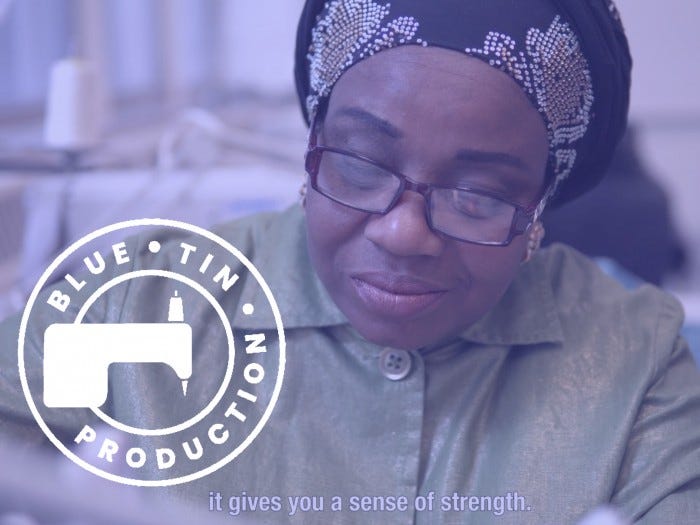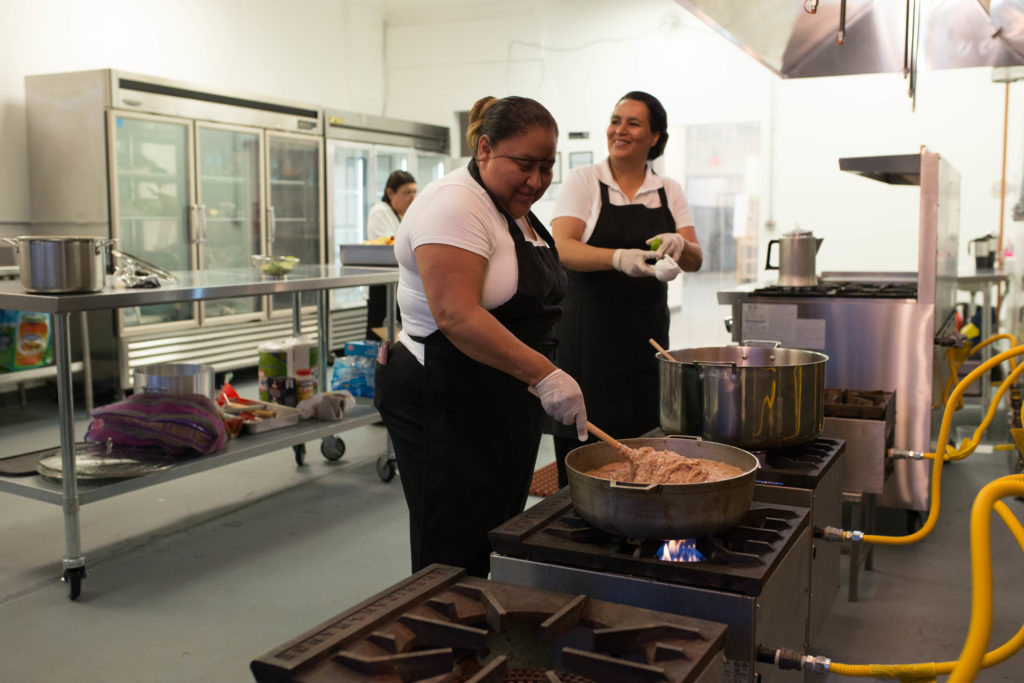New Coalition Aims to Raise Awareness and Build Capacity
by Karen Kahn

Hoda Katebi, an Iranian-American fashion designer, known for her fashion blog JooJoo Azad, has turned her sights to helping immigrant and refugee women by starting a clothing production cooperative in the Uptown neighborhood of Chicago. Blue Tin Production Co-op, says Katebi, will create jobs for women who have experienced trauma, but it will also give them the power of ownership and decision making.
Katebi, who graduated from the University of Chicago, began exploring cooperatives after searching for a production company for her own designs and realizing how exploitative the industry was. “In the fashion industry, it’s really hard to know workers are treated fairly,” she explained to reporter Hannah Steinkopf-Frank. “In fact, most contractors, including in the U.S. or E.U., do not pay their workers even the minimum wage.”
Cities like Chicago see expanding worker cooperatives as a strategy to improve the quality of jobs, mitigate discrimination, and build shared prosperity through businesses anchored in the local community.
For many workers of color, including immigrant women, quality, decent-paying jobs are hard to find. In Chicago, for example, almost one-third of the workforce earns less than $12 per hour. Cities like Chicago see expanding worker cooperatives as a strategy to improve the quality of jobs, mitigate discrimination, and build shared prosperity through businesses anchored in the local community. But creating an ecosystem in which co-ops can thrive takes time and effort.
The cooperative movement is “growing and picking up momentum,” says Stacey Sutton, an assistant professor at the University of Illinois at Chicago’s College of Urban Planning and Public Affairs, “because there is a belief that through worker ownership you are creating … a more equitable distribution of economic resources.”
Building a Stronger Cooperative Ecosystem

Cooperativa Visionarias is another Chicago cooperative in which immigrant women are building their economic future. A catering business that specializes in Mexican fare, Cooperativa Visionarias is supported by Centro de Trabajadores Unidos: United Workers’ Center, a worker and immigrant rights center on the city’s Southeast side. But, according to the Chicago Reporter, Cooperativa Visionarias, has faced financing and licensing challenges:
“State law regulating cooperatives is ill-suited to creating worker-owned businesses. The women had difficulties getting licensing from the city, obtaining a bank account and insurance for a company with more than one owner. They even struggled to find a consultant to help write a business plan and navigate issues associated with opening a cooperative in Chicago.”
To overcome these challenges, Cooperativa Visionarias is taking charge of their economic future by implementing a management model that works for them. For the last three years they have been supported by Centro de Trabajadores Unidos, which provides technical assistance and governance incubation.
The challenges faced by Cooperativa Visionarias are typical for cooperatives across the state, and now an ad hoc group calling themselves the Chicagoland Cooperative Ecosystem Coalition (CCEC) has come together to build statewide support for worker cooperatives. “The group is trying to raise awareness and build capacity,” Sutton said in a recent interview. The hope is to be able to provide funding, training, and the various business and legal services that start-up businesses need to develop and grow.
Chicagoland Cooperative Ecosystem Coalition (CCEC) has come together to build support for worker cooperatives.
“People are talking about and thinking about cooperative development as a real strategy for things like community wealth building and [addressing] the unemployment rate,” says Renee Hatcher, director of the Business Enterprise Law Clinic at the John Marshall Law School, a driving force behind the emerging cooperative movement. According to Hatcher, more than half of Chicago’s 18 cooperatives are run by women of color and immigrants.
Hatcher is the author of a report issued in August 2018 by the Illinois Worker Cooperative Alliance, “Cooperation Chicago.” The report makes several recommendations, including that Chicago and Cook County make new investments in developing the worker cooperative ecosystem, and that the Illinois legislature pass a Limited Cooperative Association statute to reduce barriers created by current state cooperative law.
“There’s a lot of energy around the worker cooperative movement … [but] the law hasn’t kept up,” Hatcher told the Chicago Reporter. “We’re proposing a new law that would…recognize the kind of innovation that’s happening and the direction that these kinds of businesses are going in.”
The new statute would facilitate capitalization, expand options for governance structures, and make worker-ownership more accessible for low- and moderate-income entrepreneurs and immigrant communities.
Support from Cook County
The emerging CCEC has gained support from the Cook County Commission on Social Innovation, formed in 2016, “to foster initiatives related to underemployment, public health, education and a slew of other issues,” according to writer Anne Field. Profiling the commission in a Forbes column, Field explains that the commissioners see employee ownership as a means of addressing Chicago’s vast wealth gap.
Growing the cooperative sector is one of three initiatives the Commission has launched to further employee ownership. The others focus on bringing ESOPs to scale and supporting conversions to employee ownership in the manufacturing sector, where many white baby boomer business owners are close to retirement and in need of a succession plan. Selling to their employees would transfer these businesses largely to communities of color.
The Cook County Commission on Social Innovation approved a resolution in fall 2018 to support the development of worker cooperatives.
Already CCEC is making progress. The Commission on Social Innovation approved a resolution in fall 2018 to support cooperative development. Significantly, the resolution encourages the Bureau of Economic Development to use community development block grants and other funding sources “to support local worker cooperatives and cooperative conversions, strengthen existing organizations that are incubating and training worker cooperatives in Cook County, and help to equip other organizations to provide such services, focusing on services to low‐income residents or in underserved areas.”
Following the passage of the resolution, CCEC held its first community meeting, attracting 80 people to discussions of how to build, sustain, and grow Chicago’s solidarity economy. A second general meeting is scheduled for March 2019.
A strong cooperative ecosystem and new financing mechanisms could make a big difference to the viability of businesses such as Cooperativa Visionarias and Blue Tin. Cooperativa Visionarias has struggled because the cooperative hasn’t had enough capital to access a commercial kitchen. The worker-owners continue to work in other jobs and fill only small orders. Says Maria Sandoval of Cooperativa Visionarias, “Making a business like this is really hard, but it is not impossible. That’s what we want people to know, especially women.”
Worker-centered incubators such as Centro de Trabajadores Unidos and CCEC, among others, hope to make it a lot less difficult by building a cooperative ecosystem that can provide the financing, legal structures, and technical support to uplift the ground-breaking work immigrant women are leading as members of cooperatives like Blue Tin and Cooperativa Visionarias.
Karen Kahn provides communications consulting and editorial support for Fifty by Fifty.
To follow Employee Ownership News, subscribe below or follow us at Medium.
